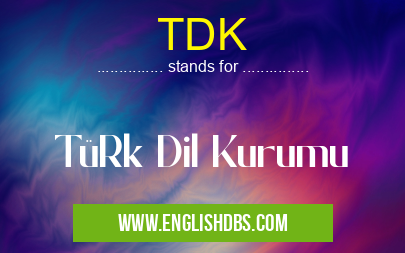What does TDK mean in TURKISH
TDK is an abbreviation that stands for Türk Dil Kurumu, which is the Turkish Language Institution in Turkey. It was established in 1932 and is responsible for protecting, developing, and promoting the Turkish language as well as researching and producing documents related to the language. Learning a foreign language can be difficult but TDK strives to make it easier by providing resources such as dictionaries, books, magazines, and other publications written in Turkish. With its efforts to promote the language both locally and internationally, TDK has helped make Turkish more accessible to people from all backgrounds.

TDK meaning in Turkish in International
TDK mostly used in an acronym Turkish in Category International that means TüRk Dil Kurumu
Shorthand: TDK,
Full Form: TüRk Dil Kurumu
For more information of "TüRk Dil Kurumu", see the section below.
» International » Turkish
What does TDK mean?
TDK stands for Türk Dil Kurumu which translates into English as the “Turkish Language Institute” or “Turkic Language Institute”. The organization was established in 1932 under the patronage of Ataturk with the aim of developing and preserving the Turkish language through research and educational activities. This national institution operates according to a set of principles outlined by Ataturk himself: strengthening national unity; improving knowledge of Turkish grammar and culture; increasing literacy rates; developing standards for publishing; establishing rules for writing, reading, speaking; preserving linguistic heritage; unifying dialects; simplifying spelling systems; launching campaigns against foreign influences on language use. TDK also publishes books, magazines, dictionaries, literary works, articles about linguistics topics and more to ensure that people can read about their native language no matter where they are located (internationally).
TDK Full Form
The full form of TDK is Türk Dil Kurumu which translates directly into English as “Turkish Language Institute” or “Turkic Language Institute”. This organization serves an important purpose by providing resources surrounding the use of the Turkish language in a variety of ways including dictionaries, books, magazines, publications written in Turkic languages and more. It’s mission is create a unified system of written and spoken language used throughout Turkey so that everyone can easily communicate no matter where they are from or what dialect they speak. By increasing literacy rates while preserving traditional aspects of Turkic linguistic heritage TDK helps bridge cultural divides throughout Turkey while encouraging education.
Essential Questions and Answers on TüRk Dil Kurumu in "INTERNATIONAL»TURKISH"
What is TDK?
TDK stands for Türk Dil Kurumu, which is an organization in Turkey that supports the study of the Turkish language.
What are the main objectives of TDK?
TDK's goal is to cultivate and develop a standard form of Turkish language and ensure its use in all aspects of life. In addition, it strives to protect linguistic heritage and promote research into and compilation of historical sources on Turkish language.
How does TDK work?
The institute works through a committee made up of members from universities, academies, archives and other educational institutions. They carefully review documents based on Turkish grammar and literature. Based on their analysis, they provide input on modern usage related to shaping the standard Turkish language.
Does TDK have any regional branches?
Yes, alongside its central office in Ankara, TDK also has six regional offices located across Turkey with branches in Edirne, İstanbul, İzmir, Samsun and Konya-Karaman. These offices conduct research as well as collect region-specific documents related to Turkish language and literature.
What other activities does TDK undertake?
Apart from conducting research and providing guidance on standards for modern usages related to Turkish language spanning grammar rules to spelling conventions, TDK also organizes workshops and publishes books related to Turkic languages spoken across Central Asia in addition to maintaining an online encyclopedia of words from several Turkic-language families.
Who funds TDK?
The primary source for funding for the Institute comes from the Republic of Turkey’s Ministry of National Education with support from various universities across Turkey including Middle East Technical University (METU) as well as foreign partners such as Germany's Max Planck Institute for Evolutionary Anthropology.
Final Words:
In conclusion, TDK stands for Türk Dil Kurumu which translates into English as “Turkish Language Institute” or “Turkic Language Institute”. This national institution was established in 1932 under the patronage of Ataturk with the primary goal being to develop and preserve the Turkish language through research and educational activities both domestically within Turkey as well as internationally across other countries who have adopted using it as either a native or second-language option among their citizens. With their commitment to educational development around standardizing rules for writing/reading/speaking while also ensuring access to published materials like dictionaries or magazines etc., they have successfully honored Ataturks vision by making learning even easier for all those wishing to learn this fascinating foreign tongue!
TDK also stands for: |
|
| All stands for TDK |
